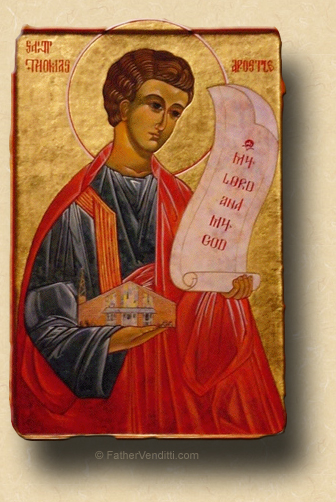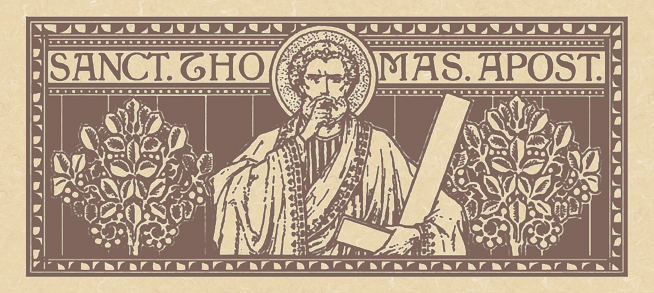Feeling Guilty Is Not a Pathology.
The Second Thursday of Easter.
Lessons from the feria, according to the ordinary form of the Roman Rite:
• Acts 5: 27-33.
• Psalm 34: 2, 9, 17-20.
• John 3: 31-36.
The Thursday after Low Sunday.
Lessons from the dominica, according to the extraordinary form of the Roman Rite:
• I John 5: 4-10.
• John 20: 19-31.*
The Thursday of Thomas Week; the Feast of Our Holy Father & Confessor Martin, Pope of Rome; and, the Feast of the Holy New Martyrs Anthony, John & Eustathius.
Lessons from the pentecostarion, according to the typicon of the Byzantine-Ruthenian Rite:
• Acts 4: 1-10.
• John 3: 16-21.
FatherVenditti.com
|
 9:54 AM 4/16/2015 — I have not been preaching to you this week because the lessons presented to us—both from Acts and from the Gospels—are mostly repeats; but, I do want to take the opportunity today to delve a little deeper into the life of the Blessed Apostle Thomas, on whom we focused last Sunday, when we read of that familiar incident between Thomas and the risen Lord, and which causes us to sometimes refer to him as “Doubting Thomas.” My intention last Sunday was to give you a different perspective on that event. 9:54 AM 4/16/2015 — I have not been preaching to you this week because the lessons presented to us—both from Acts and from the Gospels—are mostly repeats; but, I do want to take the opportunity today to delve a little deeper into the life of the Blessed Apostle Thomas, on whom we focused last Sunday, when we read of that familiar incident between Thomas and the risen Lord, and which causes us to sometimes refer to him as “Doubting Thomas.” My intention last Sunday was to give you a different perspective on that event.
Following this familiar event, Thomas disappears from the Gospel; thus, we know nothing for certain about his post-Resurrection activities. Nevertheless, according to ancient traditions, Saint Thomas reportedly landed at Kodungalloor in the year of our Lord 52, and founded seven Churches in Southern India in what is now known as the province of Kerala. His decision to go there is not as extraneous as it sounds, given that Southern India had long before been colonized by the Jews; and, the seven Churches that Thomas established in India correspond to the seven original Jewish colonies there. Some of these groups of Christians continue to exist today.
The largest group of so-called "Saint Thomas Christians," tracing their origins to the Apostle's activities in India, is the Syro-Malabar Catholic Church, an Eastern Church in full communion with Rome, which uses the Chaldean or Eastern Syrian liturgical rite. Kerala remains today India's only province with a Catholic majority, and was the only province in India where it was legal for the Church to make converts. Outside Kerala, Christians are subjected to legal—and often violent—persecution. While these persecutions subsided somewhat during the life of Mother Teresa, they returned full force after her death. Today, even Kerala has become the scene of some rather brutal anti-Catholic persecutions; and, while the current Indian government pays lip service to denouncing them, they've done very little to try and prevent them.
A so-called "Gospel of Thomas" surfaced during Gnostic times, but the Church soon rejected it as a forgery; this did not prevent the Gnostics from using its heretical contents to try to disprove the divinity of Christ in the fourth and fifth centuries. And, as you may remember, author Dan Brown used elements of this forged "gospel" in his slanderous novel, "The Da Vinci Code."
I've always felt a little sorry for the Blessed Apostle Thomas; we remember him primary for doubting our Lord's resurrection, but conveniently forget the fact that, as a missionary, he carried the Gospel farther than any other Apostle, and established vibrant Churches in the farthest outposts of the known world that remain to this day. And whenever we hear comedians make jokes about having grown up with what they call “Catholic guilt,” or are told that guilt is some kind of negative thing that we must purge from our psyche in order to be healthy, it's wise to remember the example of the Blessed Apostle Thomas, and realize that the guilt that Thomas felt for having doubted our Lord's resurrection is probably what motivated him to be the most effective missionary of Apostolic times.
Never shy away from making your daily examination of conscience. Never shy away from confessing your sins honestly and completely. It's guilt that can make saints out of sinners; and, like it was in the case of Thomas, it's guilt that can turn ordinary Christians into great Apostles for Christ and His Church.

* In the extraordinary form of the Roman Rite, outside of privileged seasons, the lessons for ferial days are those of the preceding Sunday; also, from Easter Saturday until the end of Paschaltide, the Gradual Psalm is omitted.
|

